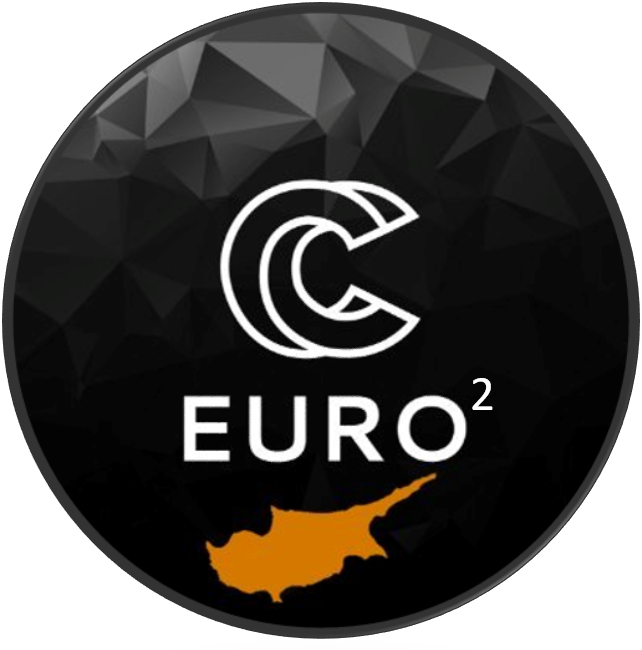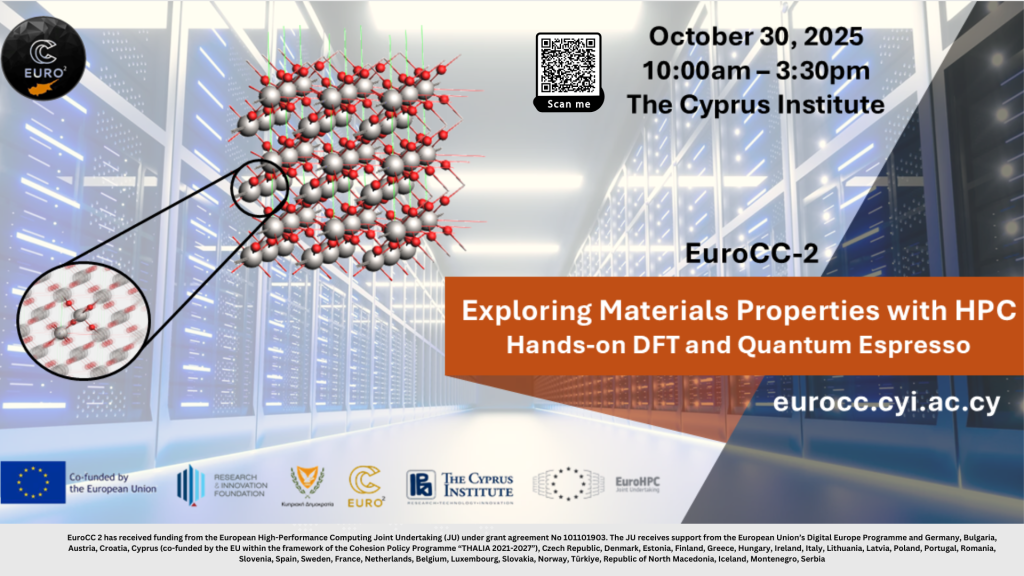
Date: Thursday, 30 October, 2025, 10:00-15:30, Cyprus time
Venue: This training event is held as a hybrid event. You are welcome to join us at the Andreas Mouskos Seminar Room, The Cyprus Institute. Otherwise please, connect to our live stream of the discussion, available on Zoom (Password: VsSCz1)
Language: English
Registration: Registration for this event is open until Tuesday, October 28th, 2025. Registration form here.
Pre-requisites: Open to participants of all backgrounds; no prerequisites necessary.
Requirements: Attendees should bring with them their own laptop (with Administrative privileges) to follow the hands-on practical. They should make sure the following software is available on their laptops: a) A web browser and PDF viewer and b) A command line interface or other client that supports SSH.
Attendees should be able to access the machine prior to the event. Instructions on how to generate the SSH key can be found at Accessing and Navigating Cyclone Tutorial. We recommend generating the SSH key via Git Bash for Windows (2.5.2. Section – Option 2 on the tutorial).
Training event material
Agenda
9:30-10:00
Hands-on Setup (Optional)
Please use this session to ensure you can access the HPC system.
10:00-10:45
Professor Vangelis Harmandaris
Introduction in Computational Modeling of Materials
This session offers a broad introduction to the foundational principles of materials science, focusing on how the interplay between structure, chemistry, and processing determines material properties. It emphasizes the powerful collaboration between experimental methods and computational modeling, with case studies in semiconductors, energy materials, and quantum systems illustrating these concepts. A special focus will be placed on the role of high-performance computing (HPC) in accelerating discovery, enabling the simulation of complex systems.
10:45-11:30
Professor Marios Zacharias
Basics of Electronic Structure Theory for Solids
This session provides a practical introduction to Density-Functional Theory (DFT) for crystalline materials, covering essential concepts such as the Kohn-Sham equations, Brillouin zone sampling, electronic band structures and density of states (DOS), pseudopotentials, and exchange-correlation functionals. The theoretical framework is directly connected to experimentally measurable quantities, including effective masses, dielectric response, and phonons.
Break
12:00-13:00
Professor Marios Zacharias
Basics of Quantum Espresso
This hands-on session offers a practical orientation to Quantum Espresso, guiding participants through the structure of input and output files, the selection of appropriate pseudopotentials, and the setup of key parameters such as energy cutoffs and k-point meshes. It covers the differences between self-consistent (SCF) and non-self-consistent (NSCF) runs, structural relaxations, and convergence testing. Along the way, we’ll highlight common pitfalls and share best practices to help participants perform robust and reliable calculations on HPC systems.
13:00-15:30
Professor Marios Zacharias & Dr. Nikolaos Patsalidis
Hands-on Exercises: SCF Convergence tests, Electronic Band Structure Calculations, Optical Absorption, and Phonons
This guided session walks participants through key workflows using Quantum Espresso, starting with convergence testing of total energy. It then covers SCF and NSCF calculations, including band structure plotting, followed by the computation of optical absorption from the dielectric function. Finally, participants will explore phonon dispersion calculations using Density Functional Perturbation Theory (DFPT). By the end of the session, attendees will leave with working input files, reproducible scripts, and a practical checklist for validating results, equipping them to confidently apply these methods in their own research.
About the speakers
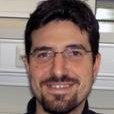
Prof. V. Harmandaris (CYI) holds the ERA Chair in “Modeling and Simulation for Engineering Applications” (SimEA) at CaSToRC in The Cyprus Institute. He heads the SimEA group, consisting of 20 members, focusing on the development of mathematical and computational methodologies, involving high performance computing and data-intensive algorithms, for complex molecular systems, with important applications in nano/bio technology. He has extensive research experience in hierarchical multi‐scale approaches combining ab-initio calculations, atomistic and coarse‐grained simulations, and continuum models, as well as in ML algorithms, for complex molecular systems. His research concerns the development of data-intensive mathematical and computational methodologies across scales, as well as the application of these methods to a broad range of systems/materials, such as nanocomposites, polymers and biomolecular systems.
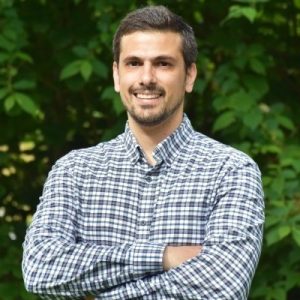 Marios Zacharias is a computational materials scientist and currently an Assistant Professor at the Cyprus Institute. Prior to this, he held a Marie Skłodowska-Curie postdoctoral fellowship at the FOTON Institute, INSA Rennes from 2023-2025. He earned his Ph.D. in Materials Science from the University of Oxford in 2017 and continued there as a postdoctoral researcher. In 2019, he joined the NOMAD Laboratory at the Fritz Haber Institute of the Max Planck Society in Berlin. From 2020 to 2021, he led the simulation group of RUNMS at the Cyprus University of Technology.
Marios Zacharias is a computational materials scientist and currently an Assistant Professor at the Cyprus Institute. Prior to this, he held a Marie Skłodowska-Curie postdoctoral fellowship at the FOTON Institute, INSA Rennes from 2023-2025. He earned his Ph.D. in Materials Science from the University of Oxford in 2017 and continued there as a postdoctoral researcher. In 2019, he joined the NOMAD Laboratory at the Fritz Haber Institute of the Max Planck Society in Berlin. From 2020 to 2021, he led the simulation group of RUNMS at the Cyprus University of Technology.
His research focuses on electronic structure theory and high-performance computing for the accurate and high-throughput modelling of anharmonicity, electron-phonon interactions, and vibronic effects in condensed matter systems. He is the developer of the EPW/ZG module in Quantum ESPRESSO and the creator, with Prof. F. Giustino, of the Special Displacement Method (SDM) for finite-temperature electronic structure calculations. Marios has also introduced a method for multiphonon diffuse scattering, enabling the interpretation of thermal and ultrafast phenomena in solids. His current work explores machine learning approaches for efficient simulations of anharmonicity and local disorder in halide and oxide perovskites.
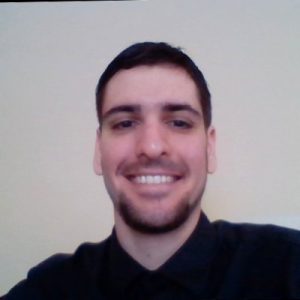
Nikolaos Patsalidis is a Post-Doctoral researcher at The Cyprus Institute where he also received his PhD (2024) on multi-scale computational modelling of complex nanostructured systems. His work includes quantum chemistry methods, atomistic methods such as molecular dynamics, and machine learning algorithms. His modelling expertise spans a wide range of systems, including polymers, polymer/solid interfaces and gas/solid interfaces.
